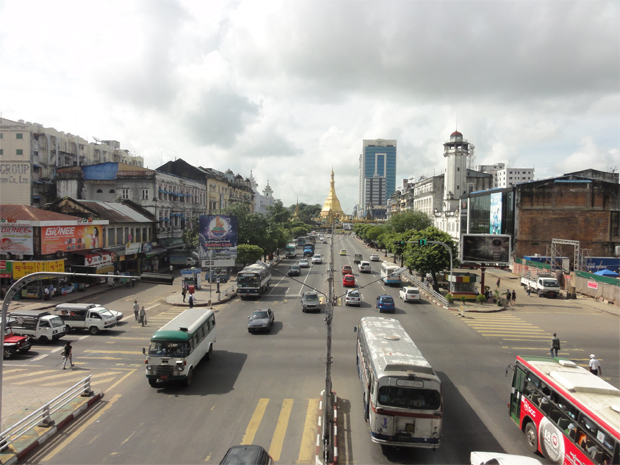Fearful its skyrocketing real estate prices could prevent foreign firms from entering and investing in Myanmar, the government is considering new property taxes to stabilize the market, deter land speculation and increase state income, despite experts urging the government not to meddle.
Land prices in Myanmar’s commercial center Yangon, have risen to higher than prices in Manhanttan – the price of one square foot of real estate along Yangon’s main road ranges from $1,000 to $1,500. Knowing it will be profitable, anyone with the funds to do so is investing in real estate.
“Whenever people make money — if they have extra money in hand — instead of putting money in a bank they just buy land,” said Moe Zaw, the founder of Myanmar Deals Leasing, a real estate leasing agency in Yangon that serves corporate and diplomatic clients. “Everyone knows you’re not going to lose money buying land.”
Even in regions outside of Yangon, prices have hiked. Following announcement of a bridge crossing the Yangon-Dala River, which was to be built with investment from South Korea, investors rushed to buy up land on both banks of the river, despite the already high prices in Yangon, as well as the fact that Dala is reachable only by ferry currently, according to Mizzima , a Myanmar news outlet.
The government, worried that such rapid real estate booms in both regions could make it difficult for foreign investors to do business in the country, have suspended the bridge building project until the end of the current government’s administration, said U Soe Thein, the Minister of the President’s Office, at a press conference in Nay Pyi Taw on Friday.
Myanmar’s next election is slated for 2015, according to the Bangkok Post , and polls are already being prepared in anticipation.
In addition, government officials are looking at ways to collect taxes based on square footage, according to Maung Maung Thein, the Deputy Minister of Finance, also at an event on Friday, in order to rein in land prices, and also generate revenue for the state, according to the Myanmar Times .
“We have [internally] proposed tax prices for land in the Yangon region, and are looking at rates for the entire country. We will make an announcement soon,” Maung Thein said.
Last year, the government axed a five-year property tax holiday, when the real estate market was already on the rise, which brought into effect a 30 percent transaction tax and a 7 percent stamp tax, both to be paid by the buyer. The real estate industry has been pressuring the government to slash that rate, but an announcement last week said the 37 percent tax rate will not be lowered, the Myanmar Times reported.
Economists, while acknowledging current prices are too high to be sustainable, have previously urged the government not to meddle, but allow the market to fluctuate according to demand.
“The rising cost of land is indeed a hindrance to the economic development of the city and the country at large. But it is not due to sellers’ greed -- it is simply the trend of demand-pull market economics,” said Professor Aung Tun Thet, a member of the State Socio-Economic Development Advisory Council and advisor to the United Nations Development Program. “We must accept this. I worry that the government will try to meddle with the market. Rather than controlling the market, infrastructure development should be undertaken and wasteland should be provided to real and potential investors.”
|
















